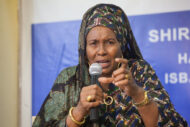A group of Somali activists are planning to launch a nationwide awareness campaign Tuesday (August 26th) on the dangers of tribalism, which they say is harmful to the country’s vision of restoring law and order after decades of civil war.
Boys show off their skills on a day out at Lido beach in Mogadishu on January 31, 2014. [AFP PHOTO / AU-UN IST / TOBIN JONES]
Boys show off their skills on a day out at Lido beach in Mogadishu on January 31, 2014. [AFP PHOTO / AU-UN IST / TOBIN JONES]
Related Articles
Kenyan tribes use maslah to quell clashes, but long-term solutions needed Somali parliament selection process slowed by political interference Somalia progresses in rebuilding armed forces, but challenges remain
“There is a big hope now of restoring nationhood, however, tribalism can undermine the good efforts that are going on,” said Aisha Abdullahi Isse, a former lawmaker in the Transitional Federal Government and current head of the Mogadishu-based Somali Anti-Tribalism Organisation (SATO).
Tribalism has undermined Somalia’s progress for years and is widely viewed as the reason for the collapse of the Mohamed Siad Barre government in 1991.
Isse said that as Somalis debate how regional administrations should be formed and territories partitioned under the country’s budding federal system, fears within tribes have increased, with many worried their people will be reduced to minority populations in what they consider ancestral areas, thereby diminishing their representation in local administrations.
“We have decided to fight against tribalism [now] so that it does not become an obstacle to the establishment of the new nation,” Isse told Sabahi.
SATO’s campaign is particularly timely because of the need to open the lines of communication among tribes and ensure federalism is used not to “loot one another” but to equitably share resources and ensure representation in government institutions, she said.
Isse said SATO’s awareness campaign will disseminate messages through the media and encourage athletes and artists to lobby for national unity.
“We are organising rallies for the public to hold consultations on this issue,” she said. “We are asking playwrights and singers to create plays and short stories to foster unity. As a way to promote complete integration, we also plan to [send] sports groups to various regions of the country, especially areas impacted by clan hostilities, to organise public games so that the youth from clans who have fought one another can play football together.”
The goal is for people to forgive one another and to come together, and for that to be implemented in all the regions, she said.
So far SATO has raised funds from its own members and their personal networks of friends and relatives but plans to hold fundraising events soon, Isse said, appealing to anyone interested in combatting tribalism to help the organisation.
Youth instrumental in fighting tribalism
Since youth are the future leaders of the country, they need to be educated about the dangers of tribalism, said Mohamed Warsame Sandhool, chairman of South and Central Somali Youth Umbrella, a Mogadishu-based civil society organisation concerned with the development of youth.
“Nothing will work for us if the youth are not educated against tribalism,” he told Sabahi. “We have to understand that tribalism will not get us anywhere, and we point out to the youth that it is tribalism that has taken the country to this level [of destruction].”
Ahmed Mohamed Mohamud, chairman of Garaad, a youth organisation in Dhusamareb, said it is important that the country’s political leaders are selected based on their competence and knowledge rather than clan affiliation.
“The people need someone competent to lead them well, but it is the politicians that are pushing the people towards tribalism,” he told Sabahi. “Elections should be based on ideology and a political programme and nothing should be based on tribe.”
Abbas Abdi Mohamed, a retired professor of sociology and politics at Somali National University, said tribalism has created great mistrust among the Somali people and that re-establishing that trust will require great effort.
“Disagreeing on the public good and never sincerely agreeing on governance is what comes from the lack of trust and doubts among the public,” he told Sabahi.
He said people who fight against tribalism face challenges including being seen motivated by personal or clan-specific interests and are assumed to be from a minority tribe.
Mohamed added that some people see anti-tribalism efforts as an agenda funded by foreign governments or an attempt to undermine those who benefited from the clan-based power sharing system.
To empower and support anti-tribalism activists, Mohamed said, everyone should be involved, especially leaders, clerics and women.
Taking lessons from the Somali Youth League
Mohamed said a new Somali Youth League (SYL) is needed to achieve a united nation, referring to the political organisation formed in 1943 that advocated Somali unity and independence and discouraged a clan-based social system.
Even though today’s fight against tribalism has its own challenges and obstacles, SYL’s history provides lessons that can be used in Somalia’s current political climate to fight tribalism and unite society, he said.
Policies the league implemented to enforce unity included banning members from asking others about their tribal affiliation.
Sandhool, of the South and Central Somali Youth Umbrella, also said SYL’s way of doing things should be followed and emulated by today’s youth groups.
“We want to use SYL as an example because we know the biggest reason SYL succeeded is because their hearts were clean and they were free from tribalism,” he said.
Sandhool said that thanks to technology, today’s youth are able to connect with one another to organise and affect change more than ever before and in ways that were not available to SYL members in the 1960s.
“What we can do now is use social media sites such as Twitter and Facebook to educate the youth and engage them in discussions [against tribalism],” he said.

 All Posts
All Posts










Shopping in our mens black nike air max 2013 online shop is a special experience.You will be also satisfited with our professional service.
[url=//goo.gl/v5u8Ew]cheap nike free runs[/url]